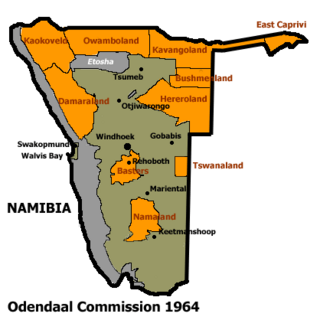
Elections in Namibia gives information on election and election results in Namibia.

The Popular Democratic Movement (PDM), formerly the Democratic Turnhalle Alliance (DTA), is an amalgamation of political parties in Namibia, registered as one singular party for representation purposes. In coalition with the United Democratic Front, it formed the official opposition in Parliament until the parliamentary elections in 2009. The party currently holds five seats in the Namibian National Assembly, one seat in the Namibian National Council and is the official opposition. McHenry Venaani is president of the PDM.
The United Democratic Front (UDF) is a political party in Namibia. Justus ǁGaroëb was the party's leader since its foundation in 1989 until 2013, when he stepped down as leader of the party.

The National Unity Democratic Organisation (NUDO) is a political party in Namibia. Esther Utjiua Muinjangue became the party’s first elected female president and the first elected female leader of a Namibian political party when she defeated the Okakarara constituency councillor, Vetaruhe Kandorozu, at the party’s third elective congress, which took place on 25-26 March 2019. At the elective congress, which was held in Windhoek, Peter Kazongominja was elected vice president and Joseph Kauandenge was elected secretary-general of the party. Muinjangue defeated the councillor by 240 to 227 votes. NUDO has been represented in the National Assembly of Namibia and in the National Council of Namibia since it split from the Democratic Turnhalle Alliance prior to the 2004 general and local elections.

The National Democratic Party (NDP) is a political party in Namibia. It was formed in 1973 as the Ovamboland Independence Party (OIP) by Silas Ipumbu. It took the name NDP to contest the elections to the Ovambo Legislative Assembly, by then under the leadership of Cornelius Tuhafeni Ndjoba. The party's base was amongst the Ovambo people.
Advocate Fanuel Jariretundu Kozonguizi was a Namibian lawyer and politician. He served as permanent petitioner to the United Nations on the issue of Namibian independence, and was a high-ranking administrator in South-West Africa prior to Namibian independence, both under South African administration and in the Transitional Government. In independent Namibia he was a member of Parliament and ombudsman. Kozonguizi was a founding member and first president of the South West African National Union.
Clemens Kapuuo was a Namibian school teacher, shopkeeper, president of the Democratic Turnhalle Alliance (DTA), now called Popular Democratic Movement (PDM), and chief of the Herero people of Namibia. Kapuuo was one of the leading opponents of South African rule of his country until his assassination following the Turnhalle Constitutional Conference.

The Transitional Government of National Unity (TGNU), also commonly called the Interim Government, was the interim government of South-West Africa (Namibia) from June 1985 to February 1989.

Below is a list of members of the Constituent Assembly of Namibia, which became the National Assembly of Namibia upon independence in March 1990. Individual members were selected by political parties voted for in the 1989 election, the first multi-racial, universal franchise elections in Namibian history.

The Turnhalle Constitutional Conference was a controversial conference held in Windhoek between 1975 and 1977, tasked with the development of a constitution for a self-governed Namibia under South African control. Sponsored by the South African government, the Turnhalle Conference laid the framework for the government of South West Africa from 1977 to independence in 1989.
The Workers Revolutionary Party is a communist party in Namibia led by Attie Beukes and Harry Boesak.
The Rehoboth Ratepayers' Association (RRA) is a local political party in Rehoboth, Namibia. It is closely affiliated with Namibia's Baster community which is centered in Rehoboth. The party was formed in 1998 by Baster leader Hans Diergaardt to the contest the 1998 local elections. Despite Diergaardt's death in February 1998, the party continued to run candidates. In 2009, the party's leader and first secretary was Lukas de Klerk.
Reggie Diergaardt is a Namibian politician and former member of the National Assembly of Namibia.

Hermanus van Wyk (1835–1905) was the first Kaptein of the Baster community at Rehoboth in South-West Africa, today Namibia. Under his leadership, the mixed-race Basters moved from the Northern Cape to leave white racial discrimination, and migrated into the interior of what is now central Namibia; the first 30 families settled about 1870. They acquired land from local natives and were joined by additional Baster families over the following years. The people developed a constitution, called the Paternal Laws.The people relied on managing herds of sheep, goats and cattle as the basis of their economy.

Constance Letang Kgosiemang was the paramount chief of the Tswana people in Namibia, a parliamentarian, and the leader of the Seoposengwe Party until its merger into the Democratic Turnhalle Alliance (DTA).
William Eric Getzen, more commonly known as Mburumba Kerina, is a Namibian politician, academic, and author. He is a co-founder of SWAPO, NUDO, and FCN, and the founder of a host of smaller political parties. For independent Namibia he was a member of Namibia's Constituent Assembly, as well as the National Assembly and the National Council. Kerina coined the name "Namib" for the independent state "Namibia" on the territory of South West Africa.
St Barnabas was an Anglican mission station, church, and school in Windhoek, the administrative centre of South West Africa. The school was situated in the Old Location suburb. When Old Location was closed for blacks in 1968 the existing buildings and institutions, among them St Barnabas, were destroyed.









